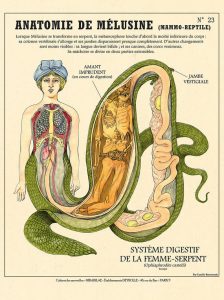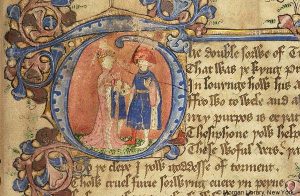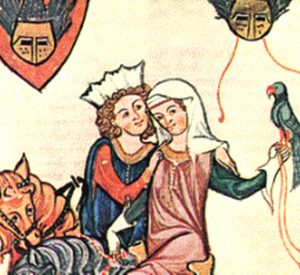The project’s doctoral student, Meritxell Risco de la Torre, and postdoctoral researcher, Timothy Bourns, were both in attendance at the White Rose 2021 Medieval Graduate Conference. The event was held online on June 17th and 18th and was hosted by the University of York and University of Leeds; the conference theme was ‘Self and Selves’, and Meri and Tim presented their research in the panel ‘Emotional Selves’. Further information about the event, including the full programme, can be found here.
Meri’s paper was titled ‘Serpentine Tears into the Sky: Selfhood, Emotionality, and the Metamorphosing Body in Le Roman de Mélusine’, and here’s the abstract:
Mélusine, as the founding mother of the house of Lusignan, has a peculiar origin story. Cursed by her fairy mother at a young age, she is forced to transform her body into a half-serpent guise every Saturday. When that monstrous bodily transformation is discovered by her own husband, Raymondin, and subsequently known by her court, the half-fairy woman flies into the sky completely transformed into a flying serpent. While her bodily transformation seems definitive, her wailing and crying into the sky is described by the narrator, and perceived by the internal audience, as the voice of a woman. The connection between body and selfhood through the representation of emotions in the story of Mélusine resonates with a contemporary audience: while the body of Mélusine changes, her humanity remains untouched, allowing her to cry human-like tears into the sky of her lands. The transformation of her body does not seem to affect the existence of her selfhood, but only the social perception of it. This paper argues that the metamorphoses of Mélusine’s body and the representation of her human-like emotional expression through wailing and tears confirms the existence of a stable, yet malleable, selfhood in the character. The previously deemed human self of Mélusine is only affected in the eyes of the society that surrounds her thanks to the visible transformation of her body, as it directly alters the (self)narrative created around her. Mélusine is, in essence, still herself, although her body has changed. Through the analysis of the changing body of Mélusine in the original romance by Jean d’Arras and the other versions of it, this paper will try and shed light on the reasons of this interest in her humanity and her selfhood through an analysis of the correlation between body, self, and emotion.
Tim’s paper was titled ‘Affective Force and Material Selfhood: The Brooches of Troilus and Criseyde’, and here’s the abstract:
Geoffrey Chaucer’s Troilus and Criseyde is one of the most powerful meditations on the nature of human love in the history of English literature. By focusing on the brooches exchanged by Criseyde and Troilus, I will argue that inorganic objects serve an important affective function within this narrative by operating as a material extension of the self.
During their first night of passionate embrace, Criseyde gifts Troilus with a brooch inset with a heart-shaped ruby, metonymically signifying her feelings for him. When the two lovers later part at the gates of Troy, Troilus gives Criseyde a tear-soaked brooch, demonstrating his sadness and ongoing affection. As her feelings shift following their separation, Criseyde passes this object on to her next lover, Diomede. When Diomede’s captured tunic is paraded in the streets of Troy, Troilus inspects the garment and his heart turns cold when he recognizes the brooch.
These objects signal the true feelings of key characters as they move from one lover to the next, with significant narrative impact and emotional consequences. The second brooch performs a communicative function, informing Troilus – and the reader – of Criseyde’s change of heart. It also produces emotional effects in Troilus; his heartbreaking discovery moves him from love to sorrow to anger. This public display of Criseyde’s changed intentions further establishes her narrative selfhood and ultimate rejection of her uncle Pandarus’ sexual machinations, in which Troilus was complicit.
Removing the traditionally anthropocentric lens of the affective turn by integrating an object-oriented approach, this article will carve new territory between emotion studies and new materialisms. Within a Chaucerian context, it offers insight into the affective force of objects and how the material can symbolically extend the self, as physical gifts bring people together – or drive them apart.




